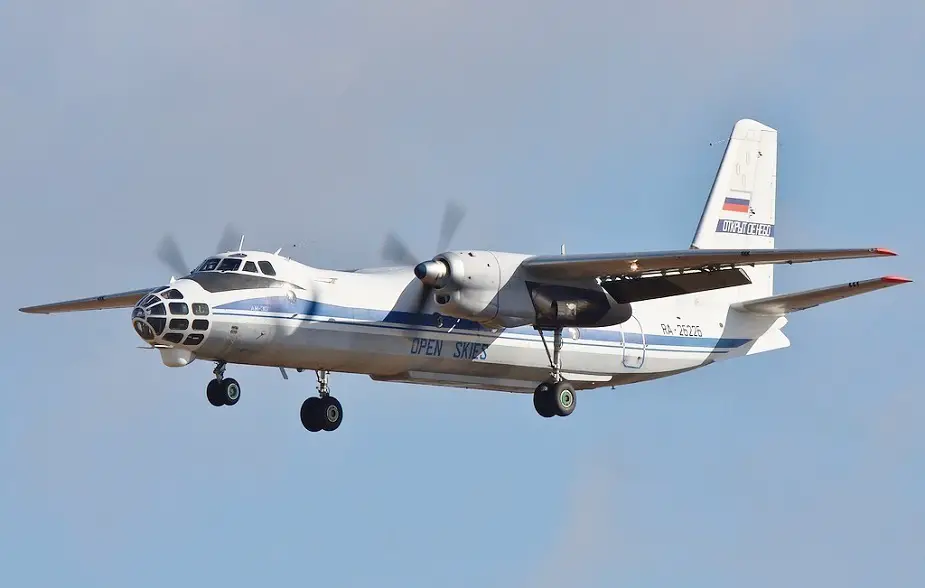Russia is ready for any scenario over the prospects of the Open Skies Treaty, Head of the Russian delegation at Vienna talks on military security and arms control Konstantin Gavrilov told TASS on April 7.
Follow Air Recognition on Google News at this link
 The Open Skies treaty allows signatory states to perform observation flights over any part of the observed state party’s territory to monitor military activities in conformity with the agreed quotas of such missions. The treaty regulates observation flights procedures, establishes a mechanism of control over its observance, and sets requirements to the aircraft and observation equipment. Pictured here, an An-30, used during Open Skies observation flights (Picture source: Russian Air Force)
The Open Skies treaty allows signatory states to perform observation flights over any part of the observed state party’s territory to monitor military activities in conformity with the agreed quotas of such missions. The treaty regulates observation flights procedures, establishes a mechanism of control over its observance, and sets requirements to the aircraft and observation equipment. Pictured here, an An-30, used during Open Skies observation flights (Picture source: Russian Air Force)
The Russian envoy thus responded to a request to comment on a claim by the Defense News media outlet that the United States would hardly rejoin the Treaty. As the Russian diplomat said, a session of the Open Skies Consultative Commission will be held in Vienna on April 26 to discuss the Treaty’s implementation.
"Any scenario won’t come as a surprise for us. We are ready for everything," Gavrilov said.
Russia has officially stated on many occasions that internal state procedures for its exit from the Open Skies Treaty continue and the documents are passing through the corresponding agencies.
"While we are a party to the Treaty, we are fulfilling our commitments. But there are no flights so far over the complex situation with COVID-19," the Russian diplomat stressed.
As the Defense News weekly claimed on Wednesday, Washington believes that its rejoining of the Open Skies Treaty would send the "wrong message" to Russia. The media outlet noted that the US administration outlined this position in a diplomatic memo sent to international partners.
US State Department spokesperson Ned Price stated in early February that the Biden administration was considering rejoining the Treaty. The US pulled out from the Open Skies Treaty on November 22, 2020. In the wake of this move, Russia’s Foreign Ministry announced on January 15 that Moscow had launched internal state procedures for exiting the Treaty. However, the Russian authorities explained that they were ready to revise their position on the Open Skies Treaty, if the US administration acted likewise.
About Open Skies:
Open Skies was signed in 1992 and came into force in 2002. The treaty establishes a program of unarmed aerial surveillance flights over the entire territory of its participants. Observation flights are made over the territories of the United States, Canada, European countries, and Russia.
The 35 state parties to the Open Skies Treaty are: Belarus, Belgium, Bosnia and Herzegovina, Bulgaria, Canada, Croatia, the Czech Republic, Denmark (including Greenland), Estonia, Finland, France, Georgia, Germany, Greece, Hungary, Iceland, Italy, Kazakhstan, Latvia, Lithuania, Luxembourg, the Netherlands, Norway, Poland, Portugal, Romania, the Russian Federation, Slovakia, Slovenia, Spain, Sweden, Turkey, Ukraine, the United Kingdom .
The main purposes of the open skies regime are to develop transparency, render assistance in monitoring compliance with the existing or future arms control agreements, broaden possibilities for preventing crises and managing crisis situations within the scope of the Organization for Security and Cooperation in Europe and other relevant international organizations. Subsequently, it is contemplated to apply the open skies regime to new fields, such as environmental protection.
In practical terms, the treaty allows signatory states to perform observation flights over any part of the observed state party’s territory to monitor military activities in conformity with the agreed quotas of such missions. The treaty regulates observation flights procedures, establishes a mechanism of control over its observance, and sets requirements to the aircraft and observation equipment.
© Copyright 2021 TASS. All rights reserved. This material may not be published, broadcast, rewritten or redistributed.
















